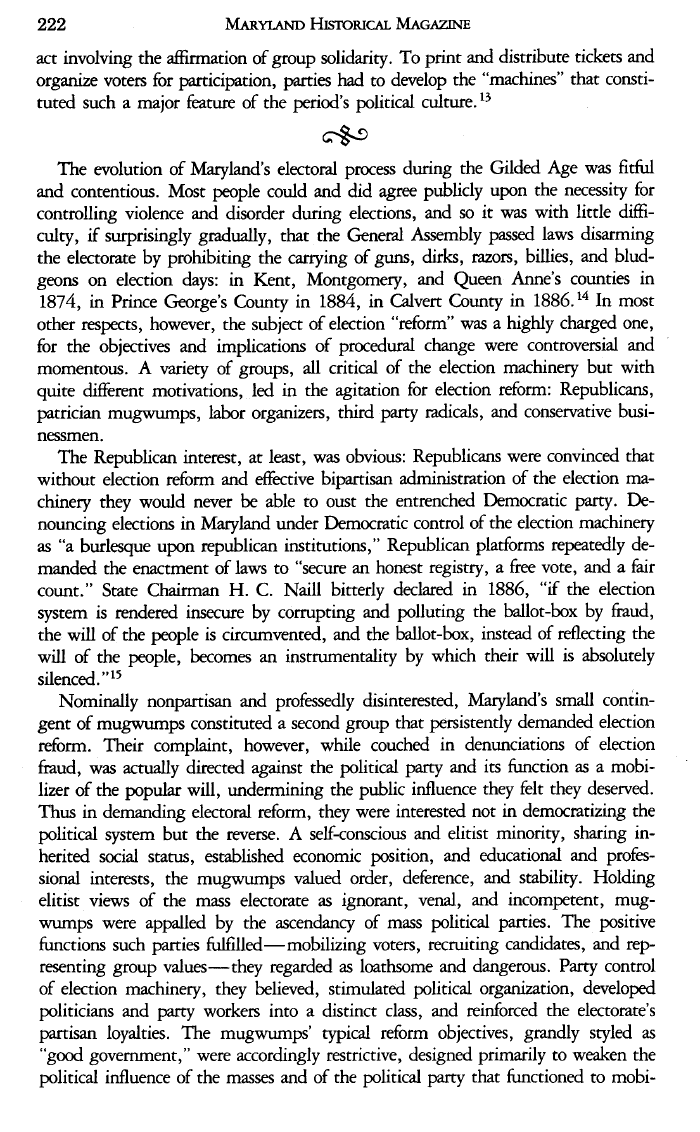|
222 MARYLAND HisToiucnt. MAGAZINE
act involving the affirmation of group solidarity. To print and distribute
tickets and
organize voters for participation, parties had to develop the "machines"
that consti-
tuted such a major feature of the period's political culture.l3
The evolution of Maryland's electoral process during the Gilded Age was
fitful
and contentious. Most people could and did agree publicly upon the
necessity for
controlling violence and disorder during elections, and so it was with
little diffi-
culty, if surprisingly gradually, that the General Assembly passed laws
disarming
the electorate by prohibiting the carrying of guns, dirks, razors, billies,
and blud-
geons on election days: in Kent, Montgomery, and Queen Anne's counties in
1874, in Prince George's County in 1884, in Culvert County in 1886.14 In
most
other respects, however, the subject of election "reform" was a highly
charged one,
for the objectives and implications of procedural change were controversial
and
momentous. A variety of groups, all critical of the election machinery but
with
quite different motivations, led in the agitation for election reform:
Republicans,
patrician mugwumps, labor organizers, third party radicals, and
conservative busi-
nessmen.
The Republican interest, at least, was obvious: Republicans were convinced
that
without election reform and effective bipartisan administration of the
election ma-
chinery they would never be able to oust the entrenched Democratic party.
De-
nouncing elections in Maryland under Democratic control of the election
machinery
as "a burlesque upon republican institutions," Republican platforms
repeatedly de-
manded the enactment of laws to "secure an honest registry, a free vote,
and a fair
count." State Chairman H. C. Naill bitterly declared in 1886, "if the
election
system is rendered insecure by corrupting and polluting the ballot-box by
fraud,
the will of the people is circumvented, and the ballot-box, instead of
reflecting the
will of the people, becomes an instrumentality by which their will is
absolutely
silenced."i5
Nominally nonpartisan and professedly disinterested, Maryland's small
contin-
gent of mugwumps constituted a second group that persistently demanded
election
reform. Their complaint, however, while couched in denunciations of election
fraud, was actually directed against the political party and its function
as a mobi-
lizer of the popular will, undermining the public influence they felt they
deserved.
Thus in demanding electoral reform, they were interested not in
democratizing the
political system but the reverse. A self-conscious and elitist minority,
sharing in-
herited social status, established economic position, and educational and
profes-
sional interests, the mugwumps valued order, deference, and stability.
Holding
elitist views of the mass electorate as ignorant, venal, and incompetent,
mug-
wumps were appalled by the ascendancy of mass political parties. The
positive
functions such parties fulfilled-mobilizing voters, recruiting candidates,
and rep-
resenting group values-they regarded as loathsome and dangerous. Party
control
of election machinery, they believed, stimulated political organization,
developed
politicians and party workers into a distinct class, and reinforced the
electorate's
partisan loyalties. The mugwumps' typical reform objectives, grandly styled
as
"good government," were accordingly restrictive, designed primarily to
weaken the
political influence of the masses and of the political party that
functioned to mobi-
|

